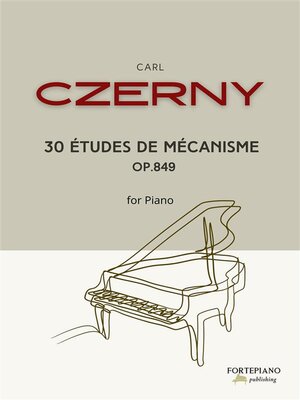Carl Czerny – 30 Études de Mécanisme for Piano, Op.849
ebook ∣ Progressive Technical Studies for Agility, Precision, and Expressive Mastery
By Carl Czerny

Sign up to save your library
With an OverDrive account, you can save your favorite libraries for at-a-glance information about availability. Find out more about OverDrive accounts.
Find this title in Libby, the library reading app by OverDrive.



Search for a digital library with this title
Title found at these libraries:
| Library Name | Distance |
|---|---|
| Loading... |
A cornerstone of 19th-century piano technique — challenging yet deeply musical.
Carl Czerny (1791–1857), Beethoven's pupil and Liszt's teacher, composed the 30 Études de Mécanisme, Op.849 to provide pianists with a progressive path to technical excellence and expressive control. First published in the early 19th century, this iconic set remains one of the most trusted collections for building solid, agile, and refined piano technique.
Each of the 30 études targets a specific pianistic skill — from finger independence and velocity to rapid passagework, articulation, and dynamic control. Yet, unlike dry mechanical drills, these studies retain musical phrasing and character, encouraging pianists to play with both precision and expression.Complete, clearly engraved edition – optimized for digital reading on tablets, e-readers, or computers. 30 progressively challenging études – ideal for intermediate to advanced technical development. Targets essential skills – agility, precision, articulation, speed, and control. Musically engaging – prepares students for both virtuosity and expressive interpretation. Perfect for teachers and self-learners looking for reliable, structured technique training. 👉 Add this essential Czerny classic to your digital library and transform your technique with studies that combine mechanical mastery and musical artistry.
Carl Czerny (1791–1857), Beethoven's pupil and Liszt's teacher, composed the 30 Études de Mécanisme, Op.849 to provide pianists with a progressive path to technical excellence and expressive control. First published in the early 19th century, this iconic set remains one of the most trusted collections for building solid, agile, and refined piano technique.
Each of the 30 études targets a specific pianistic skill — from finger independence and velocity to rapid passagework, articulation, and dynamic control. Yet, unlike dry mechanical drills, these studies retain musical phrasing and character, encouraging pianists to play with both precision and expression.







